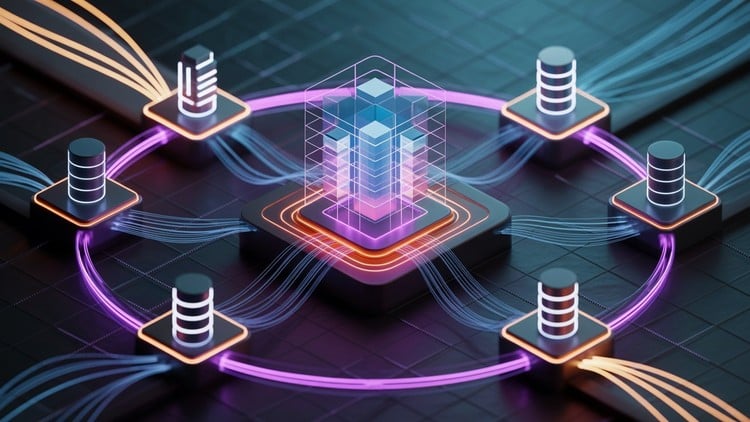
Master Distributed Systems, Networking, and Concurrency — from Sockets to Security and Cloud Foundations
⏱️ Length: 3.2 total hours
👥 13 students
Add-On Information:
Note➛ Make sure your 𝐔𝐝𝐞𝐦𝐲 cart has only this course you're going to enroll it now, Remove all other courses from the 𝐔𝐝𝐞𝐦𝐲 cart before Enrolling!
- Course Overview
- This concise 3.2-hour course introduces foundational pillars of modern software engineering: distributed systems, networking, and concurrency, providing a holistic perspective for building complex, scalable applications.
- Explore the journey from low-level network interactions (sockets) to robust security considerations and fundamental cloud architecture principles.
- Gain a conceptual roadmap connecting machine communication, parallel processing, and their convergence into resilient large-scale systems.
- Ideal for a rapid, yet comprehensive, overview of these critical, interconnected domains, serving as an essential primer for deeper technical exploration.
- Requirements / Prerequisites
- Basic programming proficiency is essential (variables, control flow, data structures). No prior advanced knowledge in these topics is expected.
- Fundamental operating system concepts (processes, threads) will enhance comprehension for concurrency and resource management discussions.
- An inquisitive mind and readiness for abstract concepts are key to building foundational understanding without prior expertise.
- Skills Covered / Tools Used (Conceptual Understanding)
- Networking Fundamentals: Understand core TCP/IP principles, client-server models, and network layers, essential for networked application design.
- Socket API Concepts: Grasp theoretical socket operations for inter-process/inter-machine communication, forming the low-level basis for network programming.
- Concurrency Paradigms: Learn processes vs. threads, shared memory, message passing, and synchronization mechanisms like mutexes and semaphores to prevent common issues.
- Distributed System Basics: Explore high-level concepts of distributed architectures, including RPC, message queues, eventual consistency, and strategies for fault tolerance and scalability.
- Security Principles: Introduce fundamental security for distributed environments: encryption, secure channels (TLS/SSL conceptual), authentication, and authorization.
- Cloud Foundations: Familiarize with core cloud computing concepts: IaaS/PaaS/SaaS models, deployment strategies, and how distributed principles apply in cloud-native applications.
- System Integration Awareness: Understand how networking, concurrency, distributed patterns, security, and cloud integrate to form cohesive, robust systems.
- Benefits / Outcomes
- Integrated Architectural View: Gain a holistic understanding of modern software system construction (network interactions to cloud deployment), fostering informed design.
- Foundational Knowledge Base: Establish a strong conceptual bedrock for advanced studies or practical projects in distributed computing, networking, or parallel programming.
- Enhanced Technical Dialogue: Improve ability to confidently articulate and discuss complex topics in distributed systems, networking, and concurrency.
- Problem-Solving Framework: Develop a systematic approach to identifying and addressing challenges inherent in concurrent and distributed environments, considering performance, reliability, and security.
- Modern Software Appreciation: Cultivate deeper understanding and appreciation for the intricate engineering behind today’s scalable, resilient applications.
- PROS
- Highly Efficient Learning: Provides a broad, critical overview of complex domains in an exceptionally short timeframe, ideal for busy professionals or quick foundational learning.
- Cross-Disciplinary Integration: Uniquely combines and demonstrates the interdependencies of networking, concurrency, distributed systems, security, and cloud, offering a rare holistic perspective.
- Conceptual Clarity: Focuses on establishing clear conceptual models and essential terminology, invaluable for approaching more advanced technical literature and practical challenges.
- Relevant & Timely: Addresses fundamental concepts crucial for navigating current and future trends in cloud-native development, microservices, and large-scale distributed architectures.
- CONS
- Limited Practical Depth: Due to its brevity, the course provides an overview and foundational concepts but inherently lacks the hands-on practice, in-depth technical specifics, or advanced problem-solving techniques required for expert-level mastery or immediate real-world implementation.
Learning Tracks: English,IT & Software,IT Certifications
Found It Free? Share It Fast!